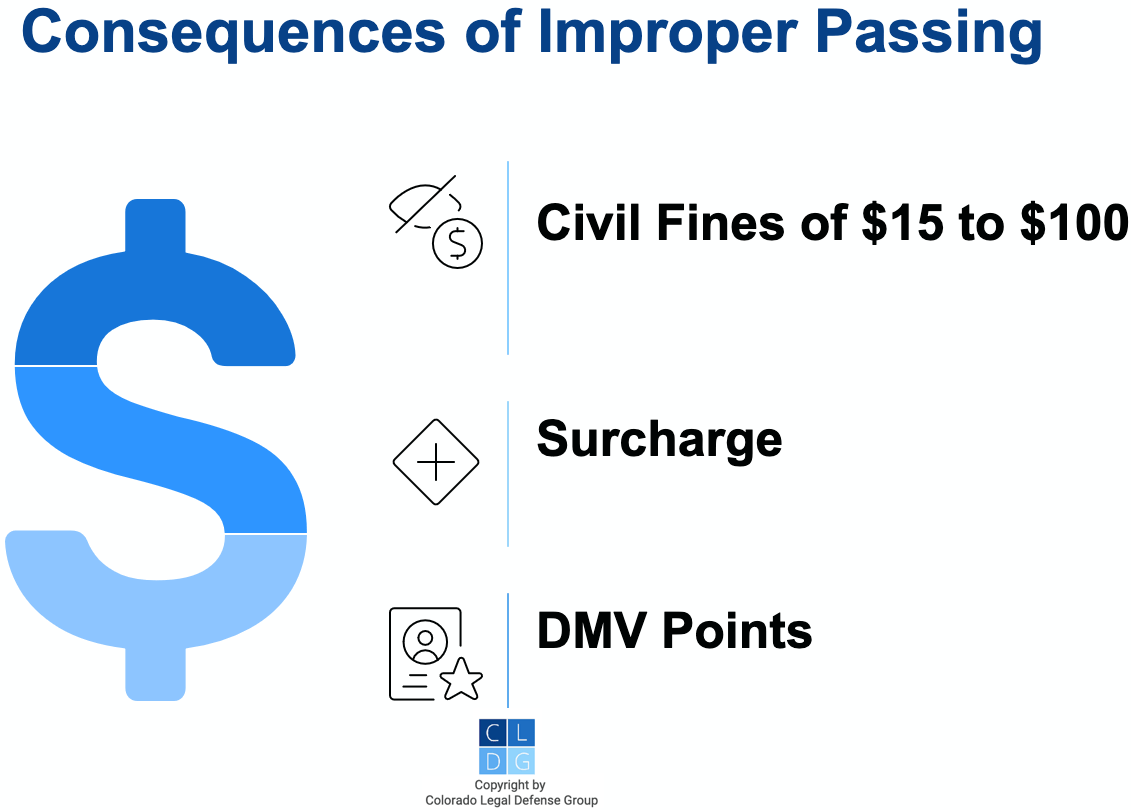Like all states, Colorado has specific laws about when and how you can lawfully pass another vehicle on the road.
Improper passing is only a traffic infraction carrying civil fines. Though in some situations, passing in an unsafe way can lead to criminal charges like reckless driving that may carry jail time.
Below I discuss what you need to know about Colorado passing laws, including when and how it is lawful to overtake another vehicle, and how to fight charges of improper passing.

When Passing is Permitted
In Colorado, you generally can pass another vehicle on the left side when the following three conditions are met:
- You have enough space to safely complete the pass without interfering with oncoming vehicles; and
- You can complete the pass without exceeding the posted speed limit; and
- The left lane is clearly visible and free of oncoming traffic for a sufficient distance to permit passing.1
In short, it must be safe for you to pass a vehicle on the left.
When Passing is Prohibited
There are several situations where passing on the left is against the law in Colorado. Some of these include:
- Within 100 feet of approaching or traversing an intersection or railroad grade crossing; or
- When approaching a curve or a hill where your view is obstructed; or
- When a solid yellow line is marked on your side of the center of the road; or
- When a school bus is stopped and displaying flashing red lights; or
- On the shoulder of the road.2
Passing on the Right
In Colorado, passing on the right is generally allowed only in two specific situations:
- When the vehicle you are overtaking is making – or about to make – a left turn; or
- On multi-lane roadways.
When passing on the right is allowed, you must do so safely and without driving off the paved portion of the roadway.3

Improper passing is typically prosecuted as a traffic infraction in Colorado.
Passing Penalties
Improper passing in Colorado is typically cited as a class A traffic infraction. This carries:
- $15 to $100 in civil fines plus a surcharge and
- 4 DMV points (in most cases).4
Accumulating too many DMV points can trigger a license suspension of six months to a year depending on your age. For example, adults 21-or-older face a license suspension for amassing 12 DMV points in 12 months.5
In addition, a traffic citation may cause your insurance premiums to increase depending on your policy. Plus, traffic infractions stay on your record forever: They cannot be “sealed” or “expunged.”6
Reckless Driving
Note that if the passing incident resulted in an accident or a particularly close call, police might instead choose to cite you for reckless driving. For you to be found guilty in Colorado, prosecutors would need to prove beyond a reasonable doubt that you drove:
“in such a manner as to indicate either a wanton or a willful disregard for the safety of persons or property.”
This is a class 2 misdemeanor traffic offense punishable by up to 90 days in jail, a fine of up to $300, and 8 DMV points.7
Fighting Improper Passing Charges
Here at Colorado Legal Defense Group, I have represented literally thousands of people cited for traffic offenses such as improper passing. In my experience, the following three defenses have been very effective at getting these infractions dismissed.
- There was an emergency situation, and any reasonable person in your situation would have done the same thing.
- Any “no passing zone” signs were not clearly marked or were missing altogether.
- The police officer made a mistake, and you did not commit an unlawful pass.
The most common evidence in improper passing cases includes traffic surveillance video, police dashcam video, eyewitness accounts, and your car’s GPS records.

Passing on the left is permissible in Colorado as long as it is safe to do so, you remain within the speed limit, and the center line is broken.
Additional Resources
Find helpful information from the Colorado Department of Motor Vehicle website:
- Point Suspensions – Explanation of how accruing points can trigger a license suspension.
- Driver Services – Frequently Asked Questions.
- Hearing Forms – Forms to request a DMV hearing.
- Auto Insurance – Overview of Colorado car insurance laws.
- Interlock Devices – Overview of when interlock devices are required for you to drive.
- Motor Vehicle Record – How to get a copy of your driving history.
Legal References
- CRS 42-4-1005. See, for example, State v. Laughlin (1981) ; Colgan v. State, Dep’t of Revenue, Motor Vehicle Div. (1981) .
- CRS 42-4-1007. CRS 42-4-1005. CRS 42-4-1903. CRS 42-4-705.
- See note 1.
- CRS 42-4-1701.
- CRS 42-2-127.
- CRS 24-72-701 – 708.
- CRS 42-4-1401.

